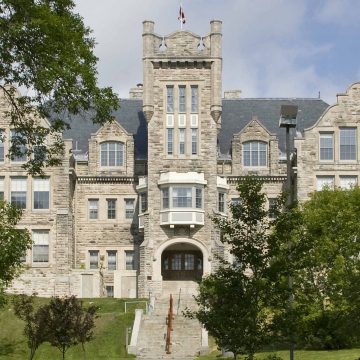Lakehead University’s law school claims its new program, which allows students to skip articling and become licensed lawyers immediately after graduating and passing the bar exam, will help address the shortage of lawyers in northern Ontario, says Lee Stuesser, dean of Lakehead’s faculty of law.
It might sound surprising to hear that Ontario has too few lawyers, particularly with the number of law school grads who are unable to secure articling spots growing from 5.8 percent to 12.1 percent since 2008.
The lack of articling positions, however, is a Toronto problem, says Stuesser. In northern Ontario, he explains, there is a dire need for more lawyers, even in larger cities such as Sault Ste. Marie, Sudbury and Thunder Bay.
Stuesser believes Lakehead’s program will help in two central ways. First, students are required to complete a four-month work placement in their third year, likely to be unpaid, at small northern firms that otherwise would be unable to afford or support a 10-month articling student. Second, introducing firms to students in a co-op environment is expected to increase the odds that firms will hire Lakehead grads as associates in the future.
People in northern communities rely on small, under-staffed firms for the most basic legal needs, such as wills, housing transactions and custody conflicts, says Stuesser, adding that when firms can’t meet the demand, there are serious social consequences: “Imagine you have a community that has no lawyer. It’s like having a community that has no doctor.”
This is a common theme in legal research today. For example, a report published earlier this fall (Precedent covered it here) made the case that Canada’s legal system needs to pay more attention to the smallest legal issues because, when unresolved, they can spiral into more serious problems. Housing troubles, the report explained, can lead to financial struggle, social exclusion and government assistance.
So far, northern firms have been enthusiastic about the new Lakehead program, says Anna Fitzsimmons, a first-year law student at Lakehead and president of the law students’ society, who is from North Bay. “Everyone in North Bay is really receptive to the fact that I’m going to Lakehead law school and they’re all really eager to see what our students can bring to the table once we graduate.”
In addition to securing placements at northern firms, Lakehead Law strategically admits a majority of its students from northern Ontario to increase the odds that its graduates will want to practice close to home. Right now, about 57 percent of its students are from northern Ontario.
Lakehead students will also be in class for an extra three hours each week compared to the average at other law schools — time that will go toward practical legal training.
While the first class at Lakehead’s three-month-old law school won’t graduate until 2016, the ability to practice law without articling or taking a Law Practice Program (LPP) is appealing to students.
“We’re getting practical training, the opportunity to do a four-month internship program and then, after that, we can still choose to article if we want,” says Ayoub Ansari, a first-year law student at Lakehead who grew up in Toronto. “From a student perspective, it’s a win-win situation.”
Photo provided by Lakehead University


